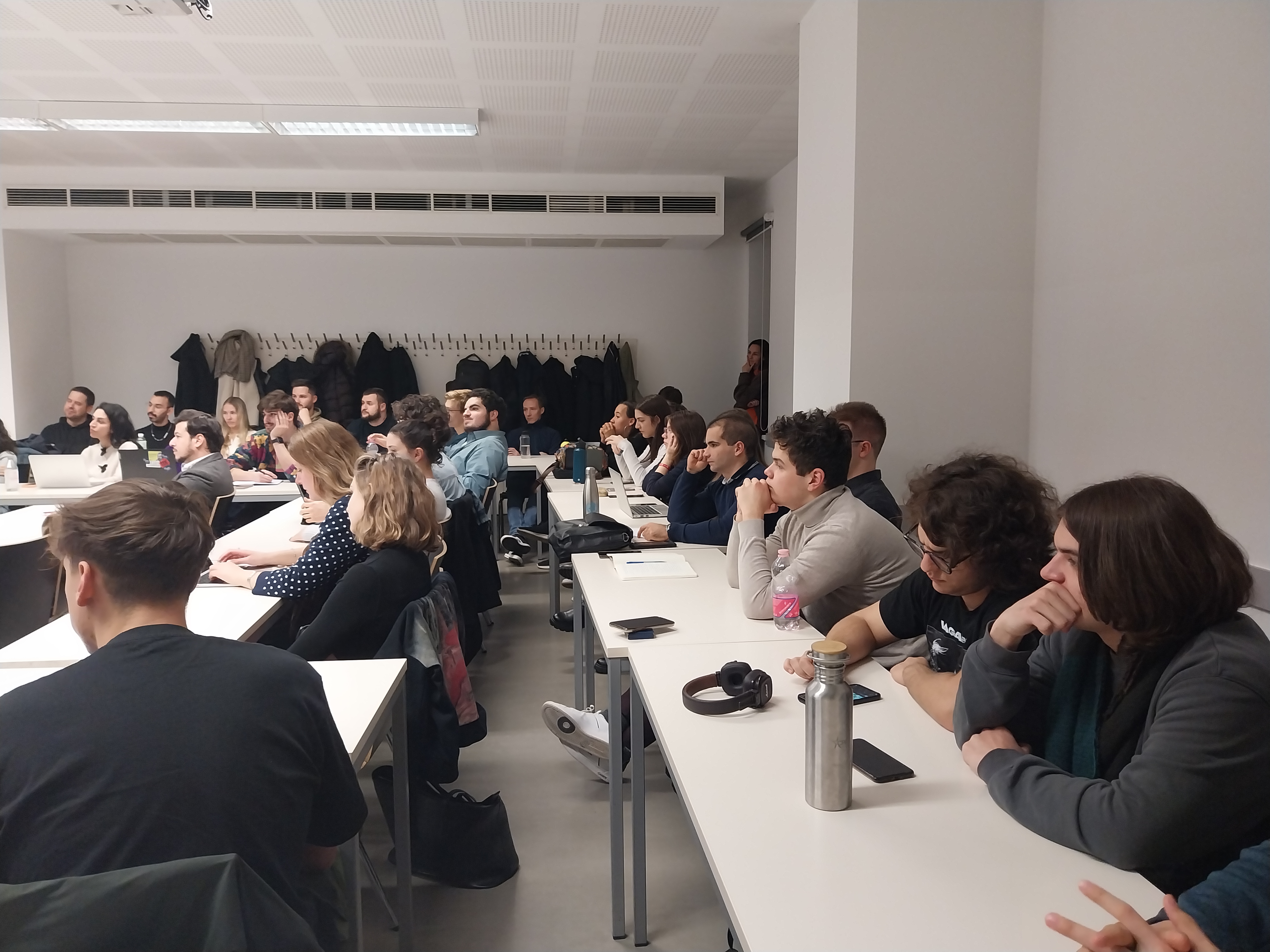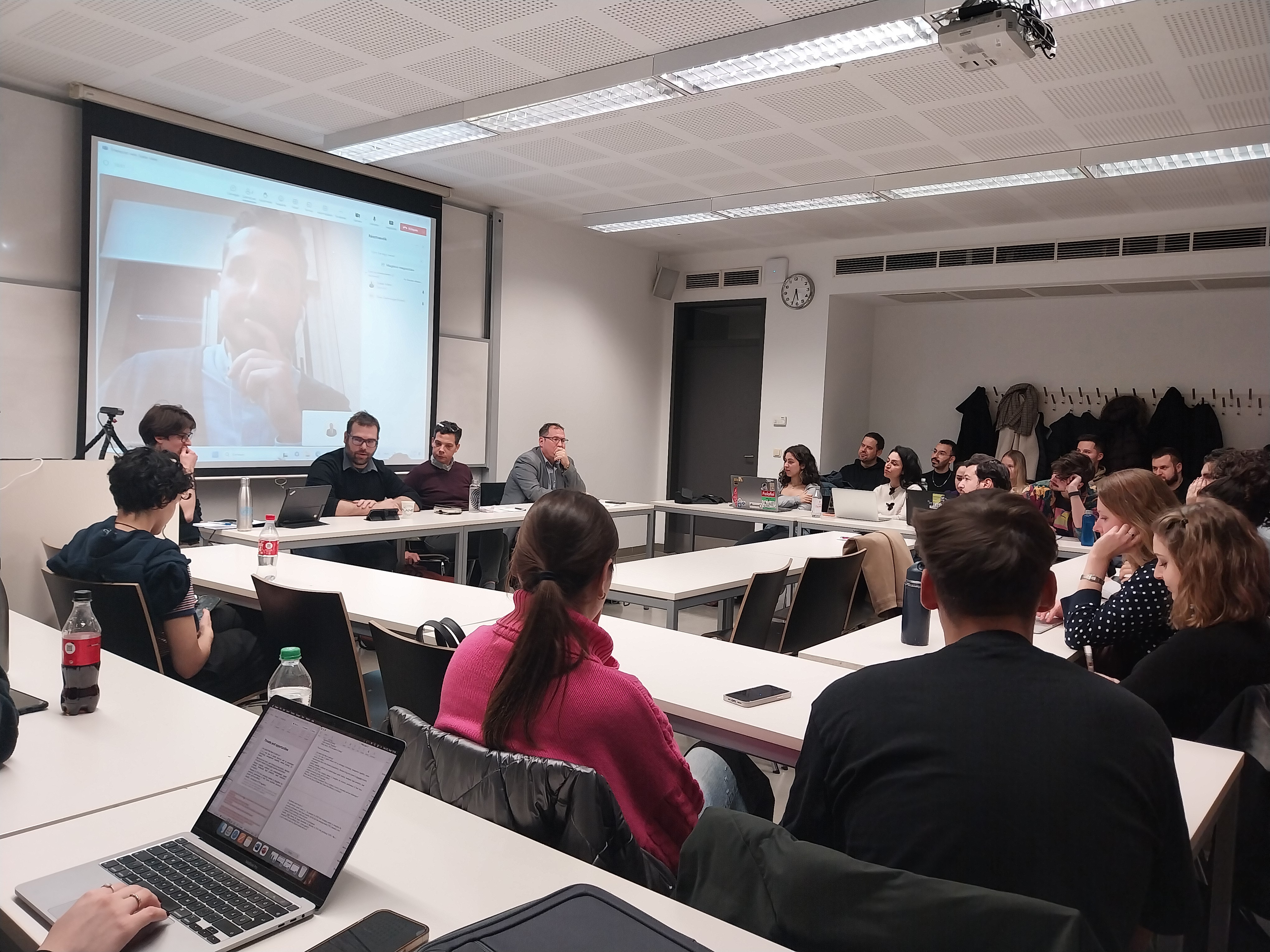IR TALKS 2: Trump and the Crises in the Middle East – What to Expect?

Participants included László Csicsmann (Corvinus University of Budapest), Elias Dahrouge (Independent Consultant & Researcher), András Léderer (Hungarian Helsinki Committee), and Máté Szalai (Corvinus University of Budapest). The discussion was moderated by Vilmos Horváth-Pajor from the College for Advanced Studies of Diplomacy in Practice.
IR TALKS is a series of guest and roundtable talks organised by the Department of International Relations at Corvinus University to make sense of the world we live in at a time of turbulent international politics.
IR TALKS 2 started with a short presentation from each expert. Elias Dahrouge talked about the sustainability of the recently announced ceasefire deal in Lebanon and expectations in the public discourse about the Trump administration. Máté Szalai continued with the perspectives from the Gulf region, especially Saudi Arabia and the United Arab Emirates, and Israel. László Csicsmann elaborated on the situation of Iran and the axis of resistance and the likely return of the maximum pressure policy, while András Léderer talked about the international regulations and institutions in refugee protection and the US role in them.
In the second half of the discussion, the participants exchanged views on specific questions raised by the audience which covered various topics, including Russian-Iranian relations, the viability of the Abraham Accords, the situation of refugees in Lebanon, and the most pressing crises facing the incoming Trump administration.

For those who would like to dive deeper into the topics of the roundtable discussion, we would like to recommend a number of podcast episodes and papers which could be useful sources for further research:
Podcasts
Beyond Gaza: Focus on regional and global players. Cinzia Bianco, Dania Thafer, & Elhan Fakhro. European Council on Foreign Relations, 2023. https://ecfr.eu/podcasts/episode/beyond-gaza-focus-on-regional-and-global-players/
Independent Thinking: Are Israel and Iran on the brink of all-out war? Bronwen Maddox & Sanam Vakil, Chatham House, 2024. https://www.chathamhouse.org/2024/04/independent-thinking-are-israel-and-iran-brink-all-out-war.
Izraeli háború: napról napra távolabb a megoldás? [The war of Israel: the solution is further and further away every day?]. László Csicsmann, Húzós podcast, 2024. https://youtu.be/0ZsYpBaT1I4?si=EyvqLd30AvnTpW8H.
Háború a Közel-Keleten. Az elmúlt 1 év mérlege. László Csicsmann with Erzsébet N. Rózsa and Péter Tálas in Partizán https://www.youtube.com/watch?v=u_VmV9W7y00
Teljesen elpusztítani nem, meggyengíteni sikerült a Hamászt Gázában [Hamas is weakened, but not completely destroyed in Hamas]. Beáta Pragi, Telex Podcast, 2024. https://telex.hu/podcast/2024/03/26/izrael-gaza-haboru-tema-podcast.
Honnan ered az ellentét Izrael és Palesztina között? Beáta Paragi, Rádió I, Balázsék, 2023, https://soundcloud.com/balazsek/3-honnan-ered-az-ellentet
Articles on Israel and Palestine from researchers at Corvinus
Beáta Paragi (2024): Hamász és iszlám ellenállás a Gázai övezetben [Hamas and Islamic Resistannace in the Gaza Strip]. Külügyi Szemle, vol. 23, no. 1, pp. 72-93. https://hiia.hu/wp-content/uploads/2024/05/5-Paragi-Beata.pdf.
Beáta Paragi és Tamás Hoffman (2024) Népirtás-e, amit Izrael folytat a Gázai övezetben? [Is Israel’s conduct in Gaza genocide? ] Qubit.hu, 2024. január 25., https://qubit.hu/2024/01/25/nepirtas-e-amit-izrael-folytat-a-gazai-ovezetben.
Beáta Paragi (2023): Megszállás és felosztás: Az izraeli-palesztin kérdés értelmezési nehézségei a nemzetközi kapcsolatkban [Occupation and Division: Challenges of interpreting the Israeli-Palestinian Question in International Relations]. Külügyi Szemle, vol. 22, no. 3, pp. 83-106. https://hiia.hu/wp-content/uploads/2023/11/05-Paragi-Beata.pdf.
Beáta Paragi (2023) A „zöld vonaltól” keletre. Az izraeli szuverenitás kiterjesztése a palesztin autonómia, illetve állam rovására. [East of the “Green Line”. The Extension of Israeli Sovereignty at the Expense of Palestinian Autonomy and Statehood.]. Külügyi Szemle 22(2): 95-116. https://hiia.hu/wp-content/uploads/2023/07/05-Paragi-Beata.pdf.
László Csicsmann & Erzsébet N. Rózsa (2022): Authoritarian Resilience and Political Transformation in the Arab World: Lessons from the Arab Spring 2.0. International Journal of Euro-Mediterranean Studies, vol. 15, no. 1, pp.3-30. https://emuni.si/ISSN/2232-6022/15.3-30.pdf.
László Csicsmann & Beáta Paragi (2023): Egy még újabb Közel-Kelet? Az Ábrahám-megállapodások háttere és regionális összefüggései [An even newer Middle East? The background and regional context of the Abraham Accords]. In: László Csicsmann & Ágnes Kemenszky (eds.): A nemzetközi rendszer alakváltozásai a 21. század elején. Budapest: Budapesti Corvinus Egyetem, pp. 35-54.
Beáta Paragi & Mate Szalai (2022) A kétállamos megoldás ellehetetlenülésének helyi összefüggései [Contemporary Issues in the Israeli-Palestinian Relations I.] Külügyi Szemle 21(1): 84-111. https://hiia.hu/wp-content/uploads/2022/05/04-Szalai-Mate_Paragi-Beata.pdf.
Mate Szalai & Beáta Paragi (2022) A kétállamos megoldás ellehetetlenülésének regionális és nemzetközi összefüggései II. [Contemporary Issues in the Israeli-Palestinian Relations II.] Külügyi Szemle 21(2): 67-91. https://kki.hu/wp-content/uploads/2022/08/3_Szalai-Paragi.pdf.
Máté Szalai – Wagner Péter (2020): The Abraham Accords. KKI Elemzések, Institute for Foreign Affairs and Trade, 2020/84. KKIElemzesek.E-2020.84-1.pdf
Máté Szalai (2017): The Alliance Dilemma of the Gulf states after the Obama Presidency. Corvinus Journal of Internatonal Affairs, vo. 2. no. 2-3, pp. 3-18.